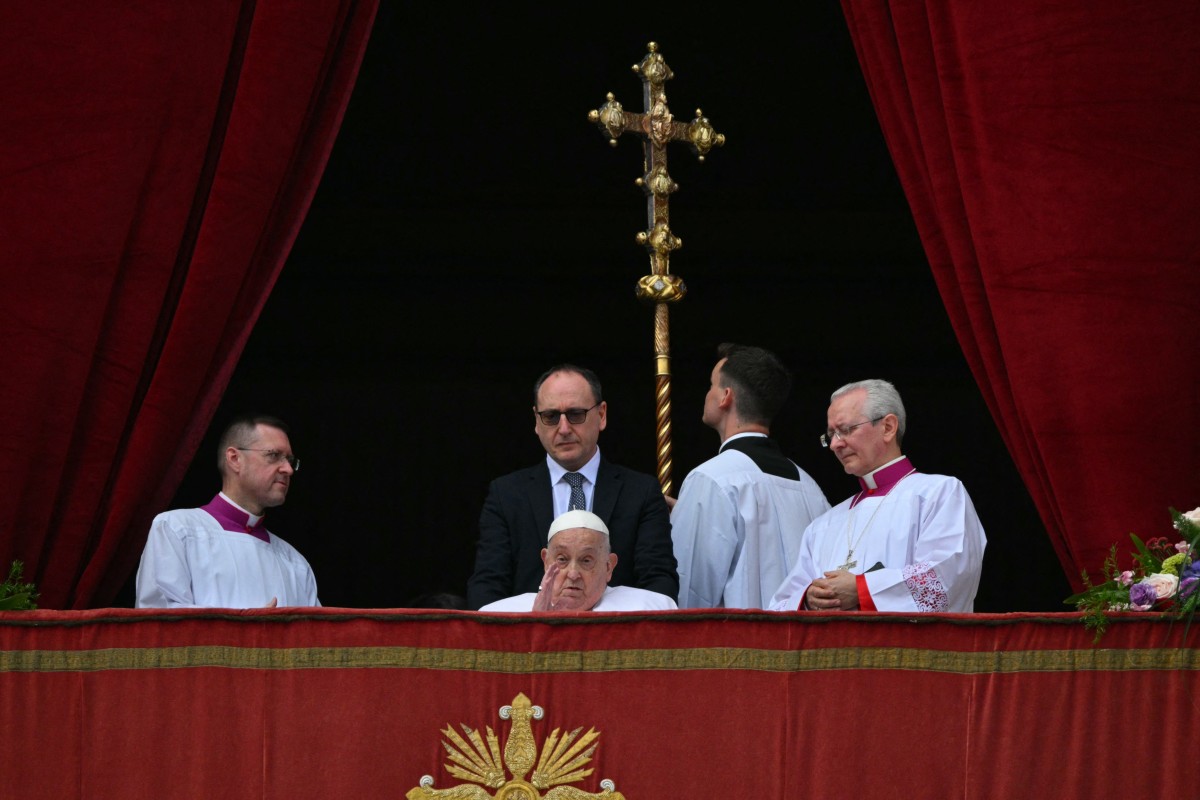Pope Francis has dedicated much of his pontificate to appealing for peace. This year on Easter Sunday, as he delivered his message and blessing Urbi et Orbi – to the city and to the world – was no exception.
From the loggia of St Peter’s Basilica, the Pope, who continues his recovery from bilateral pneumonia, greeted the crowds gathered in a tulip-filled St Peter’s Square. He then passed on his text to be read by Archbishop Diego Ravelli, the Master of Pontifical Liturgical Celebrations, and the Pope’s words rang out proclaiming: “Christ is risen.”
“Christ, my hope, has risen,” Pope Francis announced, calling on the faithful to turn their gaze to the empty tomb. He spoke of the resurrection not as an abstract idea but as a living force — one that challenges, heals, and empowers.
“Today too,” he said, “he takes upon himself all the evil that oppresses us and transfigures it.”
“Love has triumphed over hatred, light over darkness, and truth over falsehood. Forgiveness has triumphed over revenge,” he said. “Evil has not disappeared from history; it will remain until the end, but it no longer has the upper hand; it no longer has power over those who accept the grace of this day.”
But his words were not just a proclamation of faith – they were a cry to humankind, for humanity. The Pope’s gaze, even in this moment of joy, did not stray from the suffering.
Peace in the Holy Land and across the Middle East
He spoke first of the Holy Land, “wounded by conflict”, and home to an “endless outburst of violence”. He extended his closeness, in particular, to the people of Gaza and to the Christian community in the enclave where “the terrible conflict continues to cause death and destruction and to create a dramatic and deplorable humanitarian situation.”
“I appeal once again,” he said, “for an immediate ceasefire in the Gaza Strip, for the release of the hostages… and for access to humanitarian aid.”
His words once again called on the international community to act and “come to the aid of a starving people that aspires to a future of peace.”
The Pope’s prayers extended to the Christian communities in Lebanon and in Syria, “presently experiencing a delicate transition in its history,” and urged the whole Church “to keep the Christians of the beloved Middle East in its thoughts and prayers.”
Turning then to Yemen, “experiencing one of the world’s most serious and prolonged humanitarian crises because of war,” Pope Francis invited all those involved to find a solution “through a constructive dialogue.”
For healing from all political instability
For Ukraine, “devastated by war,” he invoked the Risen Christ’s gift of peace. May all involved, he said, continue efforts toward a “just and lasting peace.”
He spoke, too, of the South Caucasus, where long-standing tensions call for urgent reconciliation. In particular, he prayed for a final peace agreement between Armenia and Azerbaijan, and for healing in the region.
In the Western Balkans, Pope Francis prayed that the Easter light inspire leaders to calm tensions and reject destabilising actions choosing instead a path of harmony, together with their neighbours.
For disarmament across Africa and freedom of religion
The African continent, too, was very present in the Pope’s Easter prayers.
His first appeal came for the people of the Democratic Republic of the Congo, then for those of Sudan and South Sudan, and for those caught in the violence of the Sahel, the Horn of Africa, and the Great Lakes region. “In the face of the cruelty of conflicts that involve defenceless civilians and attack schools, hospitals and humanitarian workers, we cannot allow ourselves to forget that it is not targets that are struck, but persons, each possessed of a soul and human dignity”.
He prayed, especially, for Christians unable to live their faith freely across the continent. “There can be no peace without freedom of religion, freedom of thought, freedom of expression, and respect for the views of others,” he said. And no peace, he added, without true disarmament.
Break down the barriers that divide us
“The light of Easter impels us to break down the barriers that divide us,” Pope Francis said. These barriers are not only physical, but political, economic, and spiritual. He called on nations to use their resources not for rearmament, but to combat hunger, invest in development, and “care for one another.”
The Pope appealed to all those who hold positions of political responsibility in our world not to yield to the logic of fear but to use our resources to help those in need, “to fight hunger and encourage initiatives that promote development.” “These,” the Pope said, “are the ‘weapons’ of peace: weapons that build the future, instead of sowing seeds of death!”
Hope for the people of Myanmar
Pope Francis did not forget the people of Myanmar, who continue to suffer the effects of conflict and, most recently, the devastating earthquake in Sagaing. He expressed deep sorrow for the thousands who have died, for orphans, and for the elderly who remain. But he also remembered the hope that is emerging from the strife-ridden land: “The announcement of a ceasefire”, he said, “is a sign of hope for the whole of Myanmar”.
For the release of prisoners
His final thought was that, in this Jubilee year, Easter may also be a fitting occasion for the liberation of prisoners of war and political prisoners.
“What a great thirst for death, for killing, we witness each day” decried the Pope, before praying: “May the principle of humanity never fail to be the hallmark of our daily actions”.
Finally, the Pope emphasised that this Easter, the Risen Christ “fills us with the certainty that we too are called to share in the life that knows no end, when the clash of arms and the rumble of death will be heard no more”.
This article was originally published on Vatican News. All copyrights reserved to the Dicastery for Communication – Vatican News. Unauthorized republication by third parties is not permitted.







